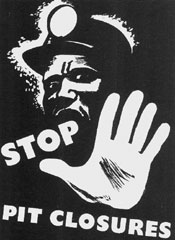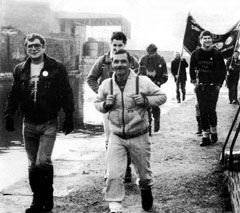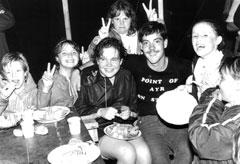
| HOME |
| NERVE |
| REVIEWS |
| ARCHIVE |
| EVENTS |
| LINKS |
| ABOUT US |
| CONTRIBUTORS |
| BACK ISSUES |
| CONTACT US |
 The
Miners' Strike of 1984/85 was a historic struggle between workers defending
their jobs and communities, and a government determined to destroy the
strength of the trade unions. The twelve month strike, which ended on
5 March 1985, has been etched deep into the consciousness of everyone
who took part. One of the lasting memories is the creation of an alternative
welfare network, started by the miners and their wives and spread to towns
and cities across Britain.
The
Miners' Strike of 1984/85 was a historic struggle between workers defending
their jobs and communities, and a government determined to destroy the
strength of the trade unions. The twelve month strike, which ended on
5 March 1985, has been etched deep into the consciousness of everyone
who took part. One of the lasting memories is the creation of an alternative
welfare network, started by the miners and their wives and spread to towns
and cities across Britain.
In Support of Miners
Celia Oakwood (formerly Jones) was instrumental in forming the first
of these community based support groups on Merseyside: the Dingle Miners
Aid, started on the Menzies Estate. "The strike was only two or three
weeks old and I was watching the news - the miners' wives were setting
up these communal eating places, and I turned to my husband and said 'We've
got to do something'. So the next night I knocked on a neighbour's door,
whose husband had been a miner at Sutton Manor, and asked if she wanted
to help. She said 'Yeah OK'.
A few of us started putting leaflets through doors asking for food or
clothing. It just took off. We were all shocked; we were deluged. It was
unbelievable. When we knocked back, if people didn't have a bag of stuff
to give on the estate - and it was a very poor estate - they would come
on a Saturday morning and drop a bag off. My house was like a warehouse."
Paul Cosgrove, who was in the Kirkby Miners Support Group, relays his
memories of the time. "I was working in the Post Office. On my way
home one evening I saw four or five young miners from Staffordshire. I
put them in touch with Kirkby Unemployed Centre, which had long been involved
in supporting various groups of workers.
Because of this tradition, a group to run the support was a natural process.
We set up links primarily with Littleton pit in Staffordshire, but also
with Mardy (in North Wales)."
 "It was really well organised - we were blessed with having good
organisers such as Tony Boyle. The reception we got was exceptional. The
miners were involved as well. These were young miners in their early twenties
and they had never witnessed this type of solidarity. They would go away
with food and donations, but also feeling that morally they weren't isolated.
The support shown wasn't just from 'dyed in the wool' trade unionists;
it was from pensioners, young people, couples, and unemployed people who
had very little themselves."
"It was really well organised - we were blessed with having good
organisers such as Tony Boyle. The reception we got was exceptional. The
miners were involved as well. These were young miners in their early twenties
and they had never witnessed this type of solidarity. They would go away
with food and donations, but also feeling that morally they weren't isolated.
The support shown wasn't just from 'dyed in the wool' trade unionists;
it was from pensioners, young people, couples, and unemployed people who
had very little themselves."
"One of the most adventurous things we were involved in was a walk
from Liverpool to Leeds along the canal - 127 miles. It raised about £2,000,
which, at the time, was a lot of money. There were meetings all along
the way and the support groups in these areas used our action as a catalyst
to keep their own campaign going."
"I was 22 in 1984," says Mike Field, who was in the Old Swan
Miners' Support Group, "and had been involved in the peace movement
as secretary of Youth CND on Merseyside. So I was already politically
active.
"The strike was just carrying on and you could see the miners getting
badly treated and I think there was a wider feeling that we had to do
something, we just couldn't sit and watch this."
The main thing we did was collections in our high street. These started
weekly, but got to be every day. We would leaflet outside workplaces,
such as Plesseys in Edge Lane, standing there at 6 o'clock in the morning
in the freezing cold."
Celia tells of how their group expanded into the rest of the local area.
"It was about August/September and we had a meeting in my kitchen.
There was a discussion about what we should do next because there was
only so much that you can do, and we were trying to keep the support going.
So we said we should go into Granby, the other half of Liverpool 8. Well
there was a big uproar over this. 'You can't do that. The miners' strike
is white man's politics!' At this time I had two Scottish miners staying
with me. I said, 'Come on', and I took them down to Granby. In those days
in Granby there were lots of young men on the corners and they did eye
you up and down if you weren't part of that community. This was because
they felt under siege. I just walked up to them and they said, 'Who are
you?' And I introduced us and said we had being doing all this miners
stuff. I never said any more, they just took the miners off us. They were
more than pleased. They said, 'Yeah, we'll help.' Then we had two or three
meetings in that area with the black community, and the miners, on the
way that the police were policing the miners' strike and the black areas
or the Granby area, and we had packed meetings."
"The whole thing brought a big consciousness of class, and the groups
became a platform for talks, not just about the miners, but many other
things.," says Mike.
We had a lot of discussions about what was going on in our city at the
time. "The Liverpool Council dispute, which now I hear of in the
local media as the 'dark days', for me, as a 22 year old, it wasn't 'dark'
at all."
'One of the things I'm proud of in Liverpool is that we stood up against
Margaret Thatcher, more than any other city. And we got really damaged
badly for doing that, for putting our heads above the parapet. I think
that people in the peace movement, and particularly of the left in this
city, should be applauded for fighting against the system of greed. Everyone
can now see what was happening.'
The end of the dispute brought heartbreak and a dread of what was going
to happen in the future. “We went down to Littleton, getting up
at 3am,” says Paul. "The miners marched back to the pit, and
we were part of that, but had to stay at the gate. It was a terrible thing
to see. All the miners that 'scabbed it' were there watching them coming
in. We did hear afterwards that there were 'fisticuffs', because it was
very emotional with pent-up anger. Ultimately it was like they were watching
their own death. These people who were sneering at those who had the bottle
to stick it out were watching their own funeral cortege - it was their
body going in."
The government were on the very edge of defeat in this dispute. They had
used informers, infiltrators and provocateurs; premeditated police violence;
attempted frame ups; bugging and surveillance on a massive scale; spending
millions of pounds in the process.* Today all but 8 pits have shut in
an industry that had 170,000 miners in 170 collieries when the strike
started.
 Celia
says, "When the strike finished, my name was given to various people
as one of those responsible for founding these miners' support groups,
so I had visits from the university people doing theses about the women.
They would say, 'Why do you think they've gone back to the kitchen sink?'
I couldn't believe they were even asking the question. I said, 'What choice
have they got? Who's going to look after the kids? They can't go off and
have careers.' That's the strength of working class women. They're not
motivated by what's going on in themselves, but by what's going on outside
of themselves. These things used to really infuriate me, because they
saw this as, 'Oh yeah, all these women have been in a struggle and they've
become class conscious. Why don't they carry it on?' It wasn't like that.
Those women were moving in defence of their communities and their families.
Yeah, it changed their way of thinking, it politicised them. But the actual
practicalities of life hadn't changed. They still had to look after the
kids; they still had to clean the houses. There might've been more men
helping with the cleaning after the strike, but basically the social conditions
hadn't changed that much really."
Celia
says, "When the strike finished, my name was given to various people
as one of those responsible for founding these miners' support groups,
so I had visits from the university people doing theses about the women.
They would say, 'Why do you think they've gone back to the kitchen sink?'
I couldn't believe they were even asking the question. I said, 'What choice
have they got? Who's going to look after the kids? They can't go off and
have careers.' That's the strength of working class women. They're not
motivated by what's going on in themselves, but by what's going on outside
of themselves. These things used to really infuriate me, because they
saw this as, 'Oh yeah, all these women have been in a struggle and they've
become class conscious. Why don't they carry it on?' It wasn't like that.
Those women were moving in defence of their communities and their families.
Yeah, it changed their way of thinking, it politicised them. But the actual
practicalities of life hadn't changed. They still had to look after the
kids; they still had to clean the houses. There might've been more men
helping with the cleaning after the strike, but basically the social conditions
hadn't changed that much really."
Mike says: "I felt gutted like I did when the dockers' strike ended.
It's part of the reason now, 20 years later, that the lack of community
has been established, by atomising people and destroying their solidarity.
That's why there's no community space. That's what was up for grabs in
that fight. I don't think solidarity has gone away, it's just having to
take a breather."
To read Celia's interview in full click
here.
To read Mike's interview in full click
here.
To read Paul's interview in full click
here.
* See 'The Enemy Within' by Seumus Milne
Printer friendly page